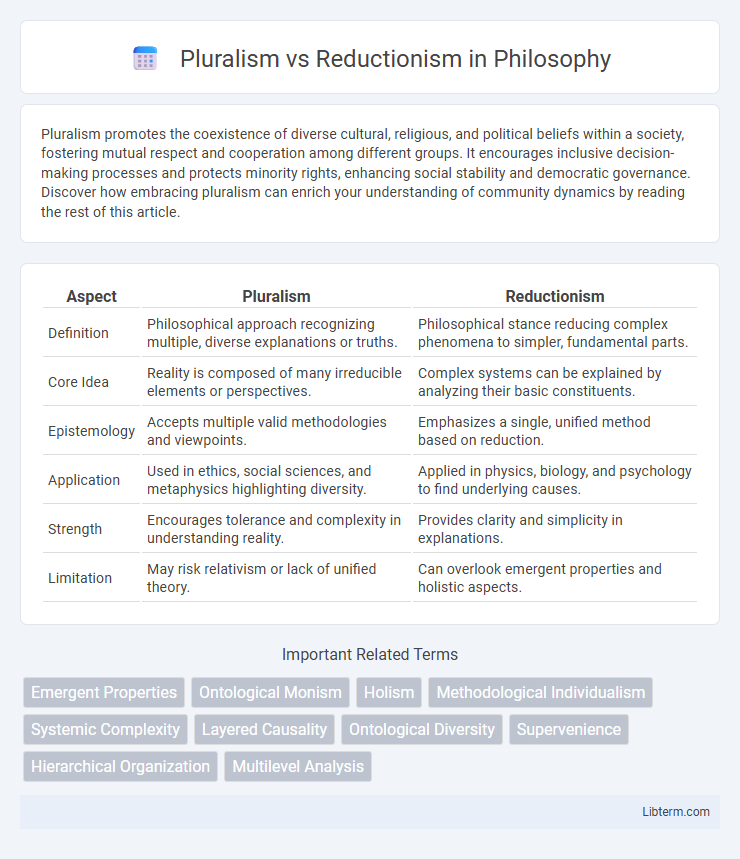Pluralism promotes the coexistence of diverse cultural, religious, and political beliefs within a society, fostering mutual respect and cooperation among different groups. It encourages inclusive decision-making processes and protects minority rights, enhancing social stability and democratic governance. Discover how embracing pluralism can enrich your understanding of community dynamics by reading the rest of this article.
Table of Comparison
| Aspect | Pluralism | Reductionism |
|---|---|---|
| Definition | Philosophical approach recognizing multiple, diverse explanations or truths. | Philosophical stance reducing complex phenomena to simpler, fundamental parts. |
| Core Idea | Reality is composed of many irreducible elements or perspectives. | Complex systems can be explained by analyzing their basic constituents. |
| Epistemology | Accepts multiple valid methodologies and viewpoints. | Emphasizes a single, unified method based on reduction. |
| Application | Used in ethics, social sciences, and metaphysics highlighting diversity. | Applied in physics, biology, and psychology to find underlying causes. |
| Strength | Encourages tolerance and complexity in understanding reality. | Provides clarity and simplicity in explanations. |
| Limitation | May risk relativism or lack of unified theory. | Can overlook emergent properties and holistic aspects. |
Understanding Pluralism: A Multifaceted Perspective
Understanding pluralism involves recognizing the coexistence of diverse perspectives and theories within a given domain, emphasizing the complexity and richness of phenomena. Unlike reductionism, which seeks to explain systems by breaking them down into simpler components, pluralism values multiple explanations and approaches as complementary rather than competing. This multifaceted perspective promotes holistic comprehension and encourages interdisciplinary collaboration to address intricate real-world issues more effectively.
Defining Reductionism: Breaking Down Complexity
Reductionism involves dissecting complex systems into their simplest components to understand underlying mechanisms, often emphasizing molecular or fundamental levels. This approach aids in identifying causal relationships by isolating variables within biological, psychological, or social phenomena. While reductionism enhances analytical precision, it may overlook emergent properties arising from the interactions among system parts.
Historical Roots of Pluralism and Reductionism
Historical roots of pluralism trace back to ancient Greek philosophy, particularly in the works of Heraclitus and Empedocles, who emphasized the coexistence of multiple elements and forces in nature. Reductionism emerged prominently during the Scientific Revolution with figures like Rene Descartes and Isaac Newton advocating for breaking down complex phenomena into simpler components for analysis. The evolution of these perspectives highlights the ongoing debate between understanding reality as a multiplicity of interacting parts versus a unified system explainable through fundamental principles.
Pluralism in Philosophy and Science
Pluralism in philosophy and science emphasizes the coexistence of multiple perspectives, theories, or methodologies to explain complex phenomena, rejecting the notion that a single framework can offer a complete understanding. It supports interdisciplinary approaches and acknowledges the value of diverse epistemologies and ontologies in addressing multifaceted issues. This perspective fosters a more inclusive, adaptive, and comprehensive view, particularly in fields like ethics, metaphysics, and the social sciences.
Reductionism: Methodologies and Applications
Reductionism employs methodologies that break complex phenomena into simpler components to facilitate analysis and understanding, commonly used in fields like molecular biology and cognitive science. Techniques such as experimental isolation, decomposition, and computational modeling help identify fundamental mechanisms underlying complex systems. Applications range from drug discovery targeting molecular pathways to artificial intelligence development based on neural network simulations.
Strengths of Pluralistic Approaches
Pluralistic approaches excel in addressing complex problems by integrating multiple perspectives, methodologies, and disciplines, enhancing the depth and breadth of understanding. This inclusivity allows for more adaptive and comprehensive solutions that acknowledge diverse factors and stakeholder viewpoints. Emphasizing interdisciplinary collaboration, pluralism promotes innovation and flexibility, effectively capturing the multifaceted nature of real-world phenomena.
Critiques and Limitations of Reductionism
Reductionism faces critiques for oversimplifying complex phenomena by breaking them down into isolated parts, often neglecting emergent properties and system interactions. This approach can lead to incomplete or inaccurate explanations in fields like biology, psychology, and social sciences, where holistic contexts significantly influence outcomes. Critics argue pluralism offers a more comprehensive framework by integrating multiple perspectives and levels of analysis, addressing reductionism's limitations in capturing the full complexity of reality.
Intersections: Where Pluralism Meets Reductionism
Pluralism and reductionism intersect in the analysis of complex systems where diverse components and underlying fundamental principles coexist. Pluralism acknowledges multiple explanations and perspectives, enriching understanding by integrating various factors, while reductionism simplifies phenomena by breaking them down into essential parts. This intersection fosters comprehensive insights by balancing broad, multifaceted views with focused, elemental analysis in fields such as philosophy, biology, and social sciences.
Real-World Examples: Pluralism vs. Reductionism
Pluralism and reductionism offer contrasting frameworks for understanding complex phenomena; pluralism emphasizes multiple perspectives and factors, while reductionism seeks explanations through simpler, fundamental components. In healthcare, pluralism supports integrated treatment approaches combining medication, therapy, and social support, whereas reductionism might focus solely on biochemical causes of illness. Urban planning illustrates pluralism by incorporating social, economic, and environmental factors to design cities, whereas reductionism could emphasize traffic flow or zoning laws as isolated variables.
Future Directions: Integrating Pluralism and Reductionism
Future directions in philosophy and science emphasize integrating pluralism and reductionism to harness the strengths of both approaches for comprehensive understanding. By combining pluralism's recognition of multiple perspectives with reductionism's focus on fundamental components, researchers can develop more nuanced models that address complexity in disciplines such as biology, cognitive science, and social theory. Emerging interdisciplinary frameworks aim to create synergistic methodologies that facilitate adaptive problem-solving and innovation across various fields.
Pluralism Infographic

 libterm.com
libterm.com